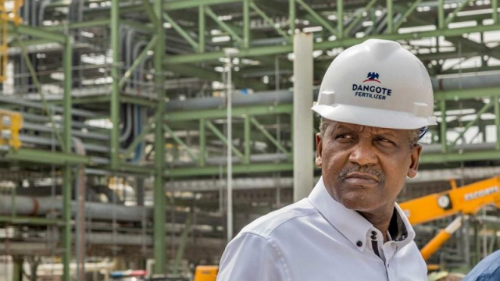Dangote to Build $2.5B Fertilizer Plant in Ethiopia

TLDR
- Aliko Dangote, Africa’s richest person, has signed a $2.5 billion agreement with Ethiopia to build a fertilizer plant
- The facility will be located in Gode, in Ethiopia’s eastern Somali region, and is expected to produce 3 million metric tons of fertilizer annually once operational
- Under the agreement, Dangote will hold a 60% stake while EIH will own the remaining 40%
Aliko Dangote, Africa’s richest person, has signed a $2.5 billion agreement with Ethiopia to build a fertilizer plant aimed at reducing the continent’s reliance on imports.
The facility will be located in Gode, in Ethiopia’s eastern Somali region, and is expected to produce 3 million metric tons of fertilizer annually once operational, Prime Minister Abiy Ahmed said in a statement on X. The deal was signed Thursday in Addis Ababa between state-owned Ethiopian Investment Holdings (EIH) and Dangote Group.
Under the agreement, Dangote will hold a 60% stake while EIH will own the remaining 40%. Brook Taye, CEO of EIH, said the partnership is designed to strengthen Ethiopia’s agricultural base and enhance self-sufficiency in farm inputs.
Dangote said the investment reflects a “shared vision to industrialize Africa and achieve food security across the continent.” Ethiopia, where agriculture accounts for more than a third of GDP, currently relies heavily on imported fertilizer.
Daba's newsletter is now on Substack. Sign up here to get the best of Africa's investment landscape
Key Takeaways
The $2.5 billion investment marks one of Ethiopia’s largest industrial projects and underscores Africa’s push to expand domestic fertilizer production. Fertilizer imports account for billions in foreign exchange outflows across the continent, constraining agricultural productivity and food security. Dangote’s expansion into Ethiopia adds to his growing portfolio of fertilizer and refinery assets in Nigeria, strengthening his role in Africa’s industrialization drive. For Ethiopia, the venture is strategic: it supports Prime Minister Abiy Ahmed’s broader economic reforms while reducing vulnerability to currency pressures and global supply disruptions. If successful, the plant could help boost crop yields, cut import dependence, and position Ethiopia as a regional fertilizer hub. The partnership also illustrates how African states are turning to private capital to fund critical infrastructure, while offering investors long-term growth opportunities tied to food demand in one of the world’s fastest-growing populations.

Next Frontier
Stay up to date on major news and events in African markets. Delivered weekly.
Pulse54
UDeep-dives into what’s old and new in Africa’s investment landscape. Delivered twice monthly.
Events
Sign up to stay informed about our regular webinars, product launches, and exhibitions.




